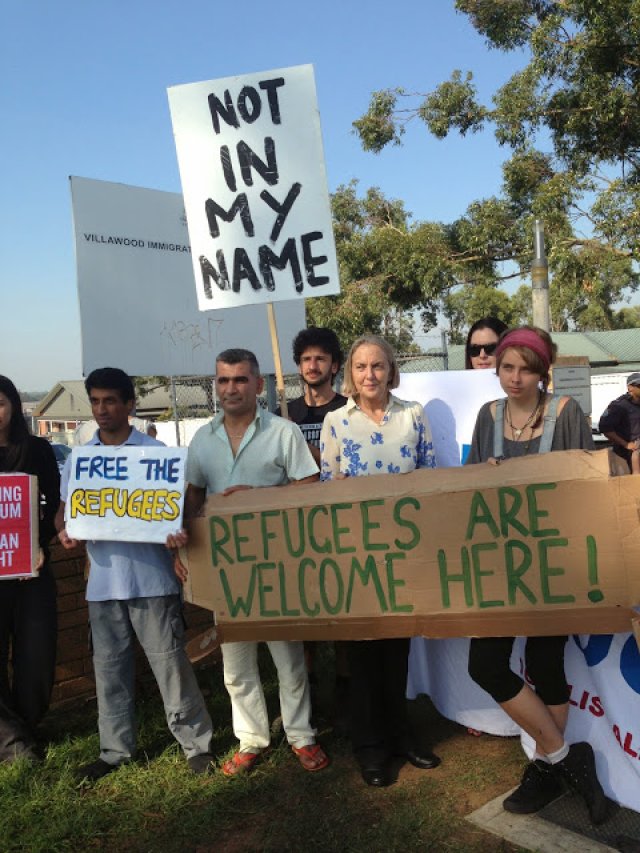
Asylum seekers claiming automatic protection after the immigration department accidently leaked their identities online in February are being transferred to the other side of the country before their case returns to court.
Buses were at the gates of Villawood detention centre early on the mornings of April 3 and 5, as refugee rights advocates including Greens Senator Lee Rhiannon held a protest against their removal outside. Asylum seekers held a sit in protest inside the centre and were trying to refuse to board.
Serco guards used forced on asylum seekers, while police began to arrest protesters trying to blockade the road.
Follow the latest at the Live Blog
The Refugee Action Coalition raised the alarm on April 1: "Up to 82 asylum seekers at Villawood detention centre in Sydney have been told they are to be shifted to Curtin [in north-west WA] and other more remote detention centres.
"Detainees were given a letter [on March 31] with the first group of people being moved on Thursday, 3 April." Other letters said detainees would be sent to Yongah Hill detention centre, a maximum security facility near Northam, an hour's drive north of Perth.
Lawyer Michaela Byers told ABC Online that 15 of her clients received a letter. They took the government to court after it published their names, nationalities and locations on its website, claiming it owed them automatic protection because the exposure put them at risk in their home countries.
Byers said she believes the transfer "is an attempt to stymie her from representing asylum seekers who have lodged legal claims against the government for leaking the details of nearly 10,000 asylum seekers in the country," the ABC reported.
"Detainees have already had their mobile phones removed from them so they are unable to communicate with anybody before their removal," she said.
The matter is due to return to court on April 4, the day after their planned removal.
RAC spokesperson Ian Rintoul said: “Communication with Curtin is notoriously difficult. There is limited access to the internet; faxes don’t work and asylum seekers must call out. There is no way to call into the detention centre."
Rintoul said the toll on those being moved could be immense: “People who have been there three and four years are being uprooted overnight. They will be cut off from the community and legal support that in some cases is the only thing that has sustained them over the past months and years.
“One of the Tamil asylum seekers, five years in detention, slated to be transferred, has severe mental health issues and actually attempted suicide in Curtin in 2011. Others have been found to be refugees and are awaiting final clearance; while others have legal cases against the department still to be heard in Sydney.
“Most of those being shifted this week could easily be granted bridging visas to live in the community rather than being sent to remote Australia."
Byers agreed and said she would appeal before a Federal Circuit Court judge, but this last minute effort failed.
RAC led a protest outside the immigration department office in Sydney on April 2. It dismissed the immigration department's claim that the reason for the move is the redevelopment of the Villawood detention centre. "A completely new section of Villawood accommodating 150 people will be opened at the end of April," it said.
In other news of the federal government obstructing the course of justice, immigration minister Scott Morrison said he was axing the Immigration Advice and Application Scheme for asylum seekers who arrived by boat or plane without a valid visa. He said this was an election commitment that would save $100 million.
This does not make much of a dent in Australia's multibillion-dollar offshore detention regime, but the unprecedented move means asylum seekers will no longer have legal support during the refugee determination process. The Asylum Seeker Resource Centre (ASRC) said refugee processing was "a legal process requiring asylum seekers to provide sufficient evidence of their claims for protection".
"Departmental officers are trained to question and interrogate those claims. For asylum seekers to navigate this process unassisted is grossly unfair [and leaves them] vulnerable to unfair decision making."
The centre's CEO Kon Karapanagiotidis said these are often "life or death decisions". The ASRC is independently funded and offers assistance to asylum seekers, an under-resourced service that Morrison says will have to pick up the government's slack.
“Access to any private and/or pro bono immigration advice by illegal boat or air arrivals will be facilitated by the Department of Immigration and Border Protection, with all costs to be met by the providers of these services,” Morrison said.
Refugee Council of Australia President Phil Glendenning condemned the changes: “For more than 20 years, successive Australian governments have funded legal aid for asylum seekers to ensure they are given a fair hearing and to provide greater assurances that they are not sent back to the danger they have fled.
“Without independent, government-funded legal advice, asylum seekers with no knowledge of Australia’s complex legal system, no knowledge of the refugee determination process and limited or no English will be told to go it alone."
The Catholic Church in Australia also condemned the move, and called on the government to immediately reinstate the legal aid scheme.